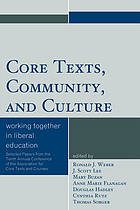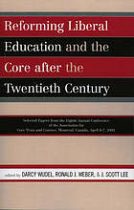Weber, R.J., Lee, J.S., Buzan, M., Flanagan, A.M., Hadley, D., Rutz, C. & Sorger, T. (2010). Core texts, community, and culture: Working together in liberal education. Lanham, MD: University Press of America.

This selection of papers from the tenth annual conference of the Association for Core Texts and Courses offers an eclectic mix of commentaries on core texts which participants have used in their own courses. The introduction addresses both the value of requiring a corpus of core texts (“works of major cultural significance”) in liberal education with particular emphasis on the creation of community.

 This timely volume critiques the effect of relying on market forces, the main tenant of Neoliberalism, on higher education. None of these factors are new, but Busch brings them together under the mantra of “neoliberalism” and argues that collectively they represent a crisis for both higher education and society.
This timely volume critiques the effect of relying on market forces, the main tenant of Neoliberalism, on higher education. None of these factors are new, but Busch brings them together under the mantra of “neoliberalism” and argues that collectively they represent a crisis for both higher education and society.  Two Canadian faculty members in the humanities take inspiration from the “slow food” movement and apply a similar concept of resisting corporatization to academia. The “slow professor manifesto … challenges the frantic pace and standardization of contemporary culture”. This book is a “must read” for faculty and administrators.
Two Canadian faculty members in the humanities take inspiration from the “slow food” movement and apply a similar concept of resisting corporatization to academia. The “slow professor manifesto … challenges the frantic pace and standardization of contemporary culture”. This book is a “must read” for faculty and administrators.  This book tells a story about “systematically inviting and supporting reflection about life’s purpose [an initiative funded by the Lilly Endowment’s Programs for the Theological Exploration of Vocation, PTVE] on dozens of college and university campuses, and among thousands of students, faculty, and staff”.
This book tells a story about “systematically inviting and supporting reflection about life’s purpose [an initiative funded by the Lilly Endowment’s Programs for the Theological Exploration of Vocation, PTVE] on dozens of college and university campuses, and among thousands of students, faculty, and staff”.  This brief book (“broadside”) is a sobering account of the rising costs of higher education, and the heights reached by student educational indebtedness. Reynolds describes this as an unsustainable “bubble” similar to the recent housing bubble (and equally likely to crash).
This brief book (“broadside”) is a sobering account of the rising costs of higher education, and the heights reached by student educational indebtedness. Reynolds describes this as an unsustainable “bubble” similar to the recent housing bubble (and equally likely to crash).  The author is a professor of English and History at Cambridge University, and the book is primarily from a British, secular and research institution perspective. But it is interesting to compare the issues he discusses with those in US Catholic higher education. Of particular note, Collini discusses Newman’s “ideal university” in a contemporary light. It is a highly readable and provocative book.
The author is a professor of English and History at Cambridge University, and the book is primarily from a British, secular and research institution perspective. But it is interesting to compare the issues he discusses with those in US Catholic higher education. Of particular note, Collini discusses Newman’s “ideal university” in a contemporary light. It is a highly readable and provocative book.  This book does not focus on Catholic universities, but rather the place of religion generally in any university. The authors address ways that “religion” (broadly defined) can successfully be incorporated on modern campuses. Their book is “not about the eternal truths of heaven, it is about the place of religion in the rough-and-tumble educational realities of the here and now”.
This book does not focus on Catholic universities, but rather the place of religion generally in any university. The authors address ways that “religion” (broadly defined) can successfully be incorporated on modern campuses. Their book is “not about the eternal truths of heaven, it is about the place of religion in the rough-and-tumble educational realities of the here and now”.